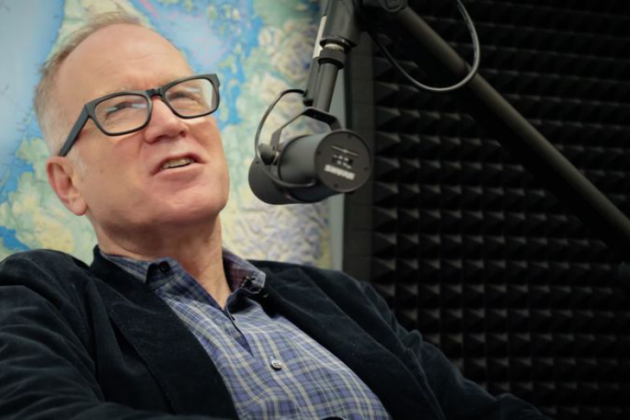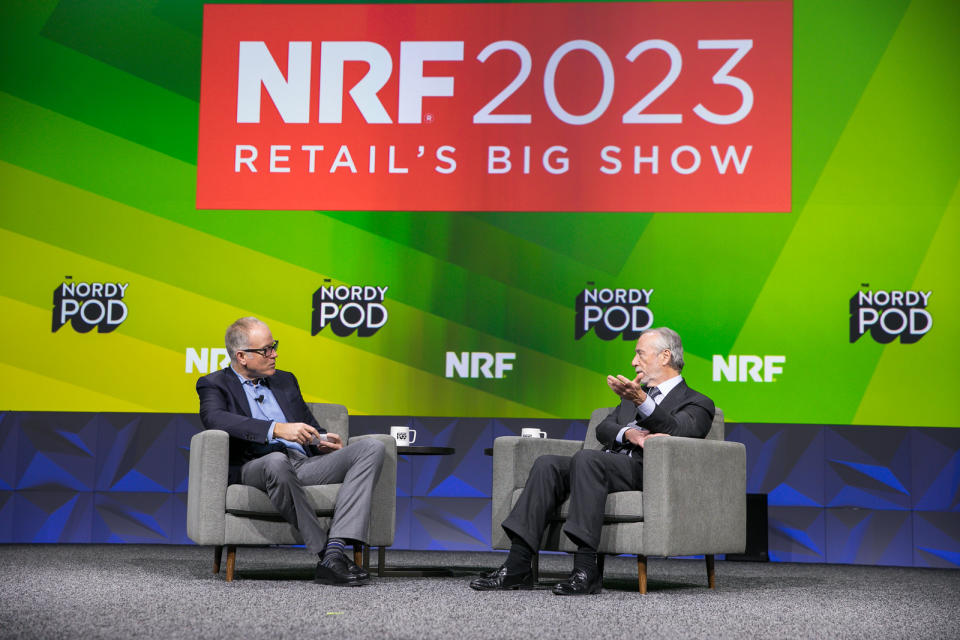Nordstrom’s Nordy Pod: What’s It All About

When the Nordy Pod series was launched a year ago, a professional host, influencer or journalist could have been hired for the series — but Pete Nordstrom took the assignment.
It’s an unorthodox, and somewhat surprising role for Nordstrom, the president and chief brand officer of Nordstrom Inc., to take on. It’s not like he needed or wanted to raise his already-high profile at Nordstrom, one of the nation’s most storied and innovative retailers, or had a few extra hours to fill.
More from WWD
Nordstrom NYFW Dinner hosted by Shalom Harlow, Tonne Goodman and Rickie De Sole
Brooklyn Museum Celebrates Virgil Abloh: Figures of Speech Opening
“I’m not trying to oversell myself as a podcast host. I don’t want the podcast to be about me. That’s not the point,” Nordstrom told WWD. “If the podcast creates an opportunity to connect with customers in a way that is compelling to them, then we should do it.”
He said conducting the podcast interviews, rather than getting a paid host to do it, lends “authenticity” to the show, considering it typically features an industry luminary or vendor that supplies Nordstrom. Leonard Lauder, Steve Madden, Domenico De Sole, Chip Bergh of Levi Strauss, Andy Dunn of Bonobos and Joe Kudla of Vuori have been among those who were interviewed.
A Nordy Pod episode could also be about Nordstrom Inc. itself, its culture and its people, or topics and people outside the Nordstrom world of personal interest to the executive. “I’m not going to sit there and talk with people I have never met or cover subjects I know nothing about,” Nordstrom said.

Since the Nordy Pod was launched in January 2022, 28 episodes have been released. According to the company, the Nordy Pod has a 4.9-star rating on Spotify and Apple Podcasts. Nordstrom declined to specify how many listeners he gets.
The format, he said, “is something we had talked about for awhile,” prior to the launch. “It wasn’t ever going to be me” hosting the show, he added. But a friend of his, the Los Angeles-based photographer and director Sam Jones, convinced him to do it, advising him that his presence would bring validity and a genuineness to the show.
“The bar to do it is not super high. It doesn’t take a huge bunch of investment,” said Nordstrom. “We had to buy some equipment, a couple of microphones, and we pay a guy to edit the episodes. That’s the biggest cost. We have done some marketing, not a lot. There have been some email blasts. But there is a pretty captive audience we can tap into without spending a lot of money. It’s a thrifty thing, and not anyone’s full-time job. It doesn’t get much more scientific than that.
“We have a new episode every two weeks,” Nordstrom said. Each requires anywhere from 90 minutes to a few hours of his time, and the shows typically get edited down to about 45 minutes. “I’m not under the gun to do it all of the time. It doesn’t take up too much of my time,” he said.
The first Nordy Pod was with Mickey Drexler, renowned for catapulting Gap and J.Crew, launching Old Navy and Madewell, and currently serving as chief executive officer of the Alex Mill brand. “I’ve gotten to know Mickey pretty well over the years. He’s a super good guy. As he has gotten older, he feels very liberated to say exactly what he thinks. He’s such a product guy. That is really inspiring to me.”
The Nordstroms’ relationship with Drexler grew tighter when the Seattle-based Nordstrom Inc. began selling Madewell in 2015 while Drexler was still running J.Crew and Madewell. One of Drexler’s big messages during the podcast was to get back to working in the office, and not at home. “In the fashion business, the product business, it makes a huge difference being there in person. Not just for the fashion. It’s about spontaneity, creativity, mixing with each other. With Zoom, you are kind of alone out there,” Drexler told Nordstrom.
The second episode centered on the Nordstrom family — Pete; Erik, the CEO of Nordstrom Inc. who also happens to be Pete’s brother, and their cousin Jamie, who serves as chief stores officer.
De Sole, who was interviewed by Pete Nordstrom at the National Retail Federation convention in New York City last January, spoke of how as a tax attorney that graduated Harvard he became chairman and CEO of Gucci; how his collaboration with Tom Ford reviving Gucci was a “very unique balance between art and commerce”; that fashion is part of human nature, and that people still love stores. “In life, it is much better to be lucky than smart,” De Sole said.
Other podcasts featured Megan Jasper, CEO of Sub Pop Records; Jessica Alba, actor and founder of The Honest Company; Doug Mack, CEO of Fanatics Commerce, and Aurora James and Emma Grede, founder and chairman, respectively, of the Fifteen Percent Pledge.
Nordstrom also interviewed Jennifer Cohen, the athletic director at the University of Washington where Pete and Erik attended college and were both “walk-on basketball players, as far deep on the bench you could possibly go,” Nordstrom said.
He’s interviewed Sue Bird, retired WNBA star of the Seattle Storm; Macklemore, the Grammy Award-winning hip-hop artist, and Chris Ballew, lead singer of the Presidents of the United States of America, so it’s often people and subjects of his personal interest, be it sports or music.
“One in the can is with the CEO of the Seattle Children’s Hospital, [Dr. Jeff Sperring]. That’s a relatively personal one for me. It’s a big hospital, a complex business. My son had open heart surgery there, at two months old. It was a tough time for my wife and I, but things went well. He’s 11 now.”
Nordstrom feels that his best podcasts are when it feels like there is a relationship between him and his subject, or a real connection. “I don’t come in with a prepared list of questions. I just want to have a conversation. I had to learn to listen better, to shut up and create a space to listen.
“It’s not a heavy lift for them to do, or for myself. There is nothing to prepare for. It’s not like you go to hair and makeup. There is no pressure.”
In terms of research, “There is not a lot of time spent other than me getting more into their history and background, but most of it comes down to them telling their story and me being curious about what they do. There is not a lot of preparation involved.”
Asked if he tells people in advance the questions, he said, “No. I rarely have written out questions, though I have indicated the kind of things I would ask about. I’m not looking to do a ‘gotcha’ thing or surprise anybody.”
The Nordy Pod includes two segments: the interview typically running from 30 to 40 minutes and a shorter segment, typically running five to 10 minutes with a customer or a Nordstrom sales associate conveying something funny or interesting that happened at the retailer. One upcoming segment will feature a discussion with a shopper with a child with cerebral palsy and how Nordstrom facilitated their visit to the store. On the other hand, “Sometimes we get feedback where we didn’t do things well, but it’s hard to get someone who is mad at us to get on the podcast,” Nordstrom noted.
Asked if creating the Nordy Pod in any way helps the 121-year-old business, he replied, “I don’t know. Our whole thing is about trying to find ways to be connected with our customers. Ultimately we would view success by the amount of engagement, but it’s hard to know how that helps.”
At the end of every episode, Nordstrom’s email is given, encouraging feedback. “We love to hear from our customers,” said Nordstrom. Some of them end up being included in the Nordy Pod.
“As long as people enjoy it, and I enjoy it too, then we will keep doing it. It’s good for me because it forces you to listen, and to be curious about what is going on in the industry. You learn stuff.
“The thing that always feels the most inspiring are people who are the most entrepreneurial, people who created something out of nothing. The Nordstrom business was on the track before Erik and I came into it. We didn’t invent this. But we had to keep it modern and relevant and interesting. Mickey scaled Gap and made it 100 percent vertical. Joe Kudla invented Vuori. We had Steve Madden talking about his shoe business. There tends to be this entrepreneurial theme that runs through the podcasts. I even interviewed a few musicians and they’ve created something. I find it fascinating talking with entrepreneurs.”
Best of WWD

